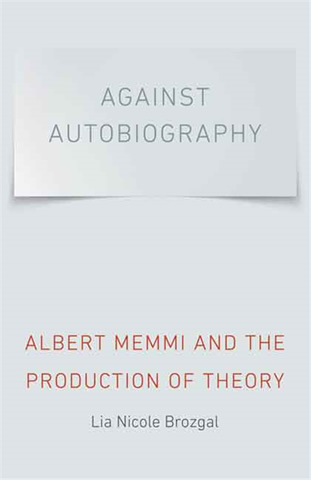Against Autobiography: Albert Memmi and the Production of Theory
By Lia Nicole Brozgal
Lincoln & London: University of Nebraska Press, 2013. ISBN 978-0-8032-4042-1.
Reviewed by Judith Roumani

This revolutionary work in Memmi studies overturns the assumptions of all those who have approached Memmi’s fiction in the same way as his essays: as thinly-veiled autobiography. Moreover, the author, who has spent several years on this work, and interviewed Memmi in depth, draws on her knowledge of francophone literature and theory to situate Memmi as a pioneer and theoretician in this field.
Memmi’s first publication was a novel, in 1953, and over the years he has steadily produced work in several genres: psycho-sociological essays, the novel, and poetry. He has always wished to be known especially for his fiction, but his rather exotic background as a child of a poor Tunisian Jewish family growing up under wartime Vichy and Nazi occupation, struggling tooth and nail to extricate himself from the limitations of his origins, taking the French cultural establishment by surprise with his first novel, and then becoming one of the spokesmen for Third World and especially Tunisian independence, becoming something of a guru of decolonization—all this has thrown him into the fray of contemporary issues. His anti-racism, pro-Zionism, defense of the rights of the oppressed, have led readers to concentrate on what he says rather than how he has said it.
Lia Brozgal brings us up short and challenges the way we have been reading Memmi. She shows the level of sophistication in his writing by analyzing, in an introduction, four chapters and a continuation, Memmi’s “francophone postcolonial” his “strategies of ambiguity” the enigmas of his “denigration of vision,” the texts, contexts, and paratexts of his Portraits, and his influence in the “post-francophone” world.
As well as being one of its most creative practitioners, Memmi was one of the original theoreticians of francophone fiction. The Prefaces to his three anthologies of Maghrebian literature (1964, 1969, and 1985), as they evolve, posit the bases of a theory of la francophonie. Though he suggested early on that francophone literature of the Maghreb was destined to disappear, it did not, but rather leveraged its use of the language of the colonizer to ‘write back’ to empire. His first two anthologies separated the creations of indigenous writers from those of ‘pieds-noirs’ French writers who happened to live in the Maghreb, while the third anthology—from the calmer perspective of the 1980s—presented the work of the two groups side by side, and used the term ‘francophone’ in its title for the first time. Brozgal notices that Memmi’s use of the term is slightly tentative: “By laying bare the preconceptions about francophonie’s past, Memmi seeks to debunk them. Yet there is a note of wishful thinking in the text, lurking in the verb tenses of the penultimate phrase: French, having ceased to be the language of a colonial nation, should no longer raise suspicion” (p. 8). Memmi’s 1985 preface and subsequent interventions on the subject of francophonie and francophone studies reveal him to be an unacknowledged theoretician in the development of postcolonial discourse. Unlike the “discipline of francophone studies [which] continues to define its archive of literary objects as exclusively extra-metropolitan” (p. 13), Memmi’s framework recognizes a place for metropolitan writers. Moreover, unlike the writers of the 1989 anthology The Empire Writes Back, Memmi believes that colonialism deeply affected the colonizer as well as the colonized, thus justifying inclusion of and attention to writers of the metropolis.
The reader may judge Memmi’s strategies of ambiguity, as revealed by Brozgal, in the extract from chapter 2 included in this issue of Sephardic Horizons by permission of the author and the publisher. As Brozgal states, “the ambiguity surrounding the purported verisimilitude of Memmi’s texts undermines attempts at reading them referentially” (p.54). Readers can savor how she identifies Memmi’s strategies of obfuscation in interviews, and how he sows more confusion than enlightenment when interviewers try to pin him down on the basic facts of his life.
In a later chapter, “From Colonizer and Colonized to Decolonization and the Decolonized: Texts, Contexts, Paratexts,” Brozgal analyzes Memmi’s 2004 Decolonization and the Decolonized in a paratextual relationship with his 1957 Colonizer and the Colonized. The later text is no longer subjective, as Memmi has written himself out of the story when he discusses the “decolonized Arab-Muslim” (p. 112). This latter essay has been somewhat misunderstood. Memmi usually situates himself on both sides of the boundary line between inside and out, knowing both the colonizer and the colonized “from the inside” (as he says) and, “functioning as a ‘permeable membrane’ that both divides and connects, the ambiguity of his authorial persona in turn produces an ambiguous text” (p. 113).
Brozgal sheds some light on the context surrounding Memmi’s diary of 1956-57 (of which an extract is published in this issue of Sephardic Horizons). She tells us that those years in Tunis constituted a period of intense creativity for Memmi when, having published his first novel Pillar of Salt, he was at work on twin essays in the “heightened political activity and intellectual engagement of pre-independence Tunisia” (p.123).
Lia Brozgal finds that, though there has been a recent challenge to the term ‘francophone’ from those who support the idea of ‘littérature-monde’ (deemed to be freed from any colonial connotations implied in ‘francophonie’), Memmi’s original use of the term in 1985 is still valid and useful. She presents a refreshingly original re-evaluation of Memmi’s writings, both fiction and essays, that is one of the most important contributions to the field of Memmi studies, and is inaugurating a new wave of interest in the work of this very creative writer. This highly scholarly book, rounded out by a lengthy and useful bibliography, belongs on the shelf of anyone interested in Memmi’s work, whether his fiction or essays.
Judith Roumani is the editor of Sephardic Horizons and translator of Memmi’s novel The Desert.